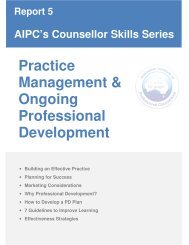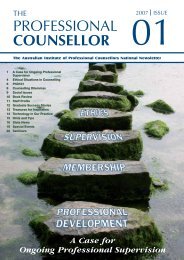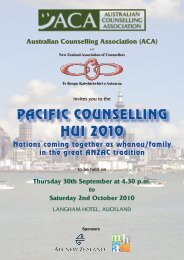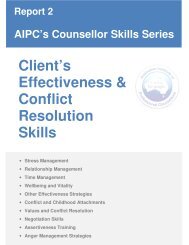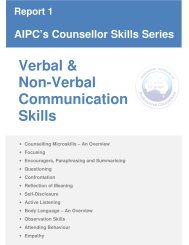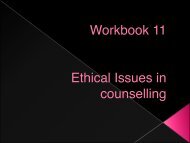Why Diversity? - Counselling Connection
Why Diversity? - Counselling Connection
Why Diversity? - Counselling Connection
- No tags were found...
You also want an ePaper? Increase the reach of your titles
YUMPU automatically turns print PDFs into web optimized ePapers that Google loves.
AIPC’s Counsellor Skills Series, Report 3WORKING WITH CHILDRENAs children travel through the journey of life they are faced with many differentdevelopmental challenges. Early in life, babies learn to pay attention and be part of arelationship. As they grow they learn to use their imagination and think logically. Greenspanand Salmon (1995) developed a road map outlining the emotional milestones children needto pass through on their way to a healthier, mature personality.They propose that at each stage children learn basic abilities that carry them forward into thenext stage and as children pass through these emotional milestones their ability to think,reason and feel become more advanced.Stage 1: The Ability to Look, Listen and Be Calm - One of the first abilities that all babiesneed is to be calm so that it is possible for them to be interested in and attentive to people,things, sounds, smells and movements. If on the other hand the baby is sensitive to noisesand unexpected hugs they may become overwhelmed and find it more difficult to be calm.Stage 2: The Ability to Feel Close to Others - At this stage children have the ability to feelclose to others. The child’s inner security gives them the capacity to be warm and trusting.On the other hand children who are aloof, withdrawn or expect to be humiliated can becomeisolated and unable to relate to people in a warm trusting way.Stage 3: Two-Way Communication - At the communication stage children learn to readbody language and facial expressions. They also learn to form mental pictures or images sothey may form ideas about their wants, needs and emotions. They are able to feel whetherthey are safe and secure with an adult or whether the adult is dangerous, critical or rejecting.Children who have difficulties understanding facial expressions or changes in vocal tone findit difficult to make these quick and intuitive judgements.Stage 4: Emotional Ideas - At this stage, children can start to exercise their minds, bodiesand emotions as one. They learn how to form mental pictures or images about their wants,needs and emotions and begin to use an idea, expressed in words, to communicatesomething about what they want, feel, or what they are going to do. Having this ability opensa whole new world of opportunities and growth.Children who use emotional ideas in make-believe play e.g. dolls hugging or fighting, ormaking up a story about how another child might be feeling, are making creative leapsbased on this ability to use their imagination. If children are sensitive to visual images and tochanges in vocal tone, a make-believe story e.g. animal faces and strange voices, may befrightening and overwhelming. These children are very nervous about entering into the worldof fantasy and imagination.According to Greenspan and Salmon (1995), children who have problems controlling theiraggression often have difficulty acknowledging their own feelings and expressing the idea ofthose emotions through words. They have found that children who have an action approachto life may have a certain degree of difficulty identifying their intentions and feelings;therefore use aggression as a way to cope with challenging situations.Stage 5: Emotional Thinking - When children reach the emotional thinking stage they gopast labelling a feeling, they become able to think with these images starting to connect anidea and a feeling and recognizing that one is causing the other e.g. they might say “I’mangry today because you didn’t come and play with me”. At this stage children start to makethe distinction between fantasy and reality. They understand more about what is comingfrom inside them and what influences are external to them.Page 10





